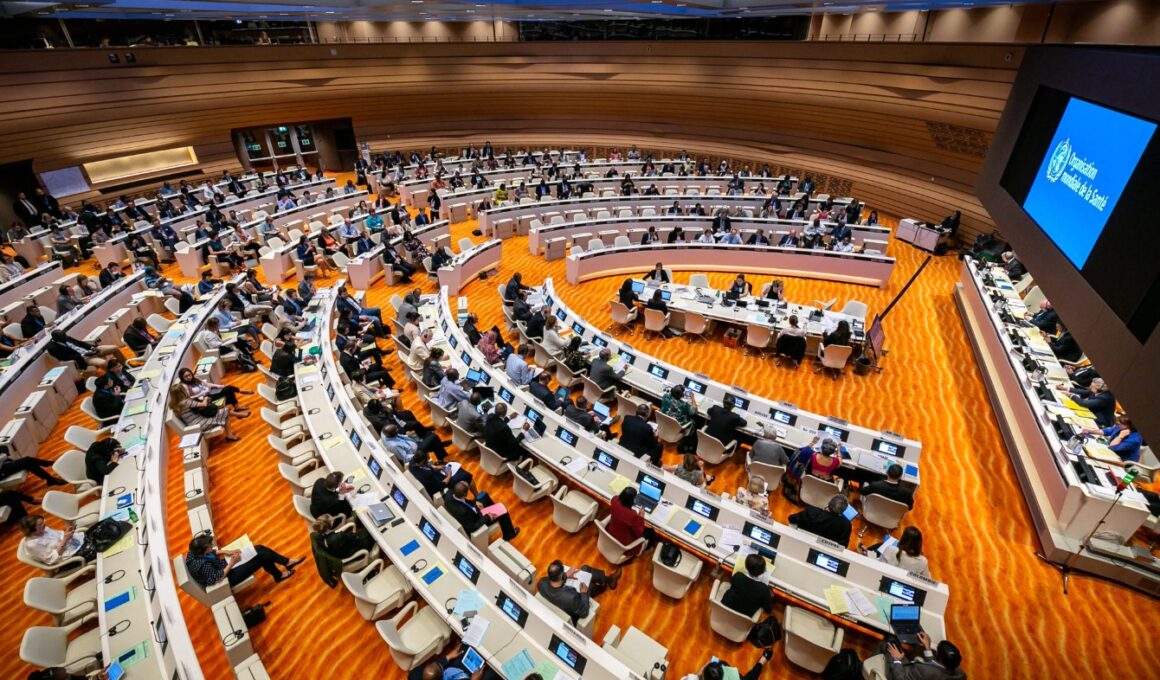Milestone Moment for Pandemic Treaty in Geneva — Calls for Tough Decisions by Countries
Health Policy Watch
Elaine Ruth Fletcher
26/11/2021
As pandemic treaty negotiations kick off again at the World Health Organization (WHO) in Geneva this week, countries face a stark choice.
Will they decide to move ahead on a new system that vests an independent entity with greater powers to monitor their own national alert and responses — in the name of faster pandemic response for everyone?
The initiative to create a new pandemic treaty to redress the key weaknesses seen in the global response to COVID-19 is enjoying a flurry of last minute support from countries and global health advocates ahead of a World Health Assembly special session, starting Monday that will take up the issue formally.
“The ongoing chaos of this pandemic only underlines why the world needs an ironclad global agreement to set the rules of the game for pandemic preparedness and response,” said WHO Director General Dr Tedros Adhanom Ghebreyesus in a media briefing in this week’s lead-up to the milestone moment .
Some 70 countries are now said to be backing the treaty initiative, championed by Germany, the European Union and the United Kingdom but also supported by countries like Chile, Kenya, Rwanda, Korea and Thailand .
The United States also has reportedly softened its previous opposition — although Washington continues to have qualms about getting behind a new instrument featuring legally binding rules that would provide a carte blanche entry for treaty enforcers to enter sovereign states to investigate and monitor compliance, western diplomats in Geneva told us on Friday.
Among the aye-sayers, strong public statements of support have recently been registered in: a BMJ op-ed by 32 ministers of health ; as well as appeals by the former co-chairs of the Independent Panel for Pandemic Preparedness and Response (IPPR); and another ad-hoc Panel for a Global Public Health Convention , to name just a few.
“There’s now a groundswell of support,” said Dame Barbara Stocking, former head of Oxfam Great Britain and leading voice in the latter, in an interview. She cited three “fundamental problems” with the existing International Health Regulations, drafted nearly two decades ago:
“There is no compliance mechanism. The IHR was written for all health hazards and not for all pandemics, while the problem with pandemics is that they have exponential growth. You can’t wait and see what happens. And the whole precautionary principle is not there.”
Analogue process in a digital era
The Independent Panel, in a report earlier this year, called current alert processes “analogue” measures that aren’t at all fit for purpose in a digital age. Specifically, the IHR regulations:
- Don’t explicitly require countries to notify WHO of new and emerging pathogens of concern — unless national health authorities have determined there is “significant risk of international spread” and/or “significant risk of international traffic or trade restrictions.” Under those vague criteria, China in fact, had no clear obligation to notify WHO of the “novel coronavirus” circulating in Wuhan, when they did in early January 2020;
- Lack any clear mechanism for monitoring, reporting or verification of countries’ preparedness and response. In fact, the word “monitoring” only appears two times in the IHR text with respect to monitoring the individual arrivals of individuals or freight at country borders;
- Lack clear reference to obligations for essential for rapidly developing treatments. Treaty sceptics, however, say the pathogen-sharing Nagoya Protocol of the Convention on Biodiversity provides a framework for such pathogen sharing along with the sharing of research benefits, such as new vaccines.
Emerging out of the era of the first SARS outbreak in 2002–03, a more deadly but less contagious virus, the IHR also is highly preoccupied with curbing countries’ excessive use of penalising travel restrictions.
In contrast, in the SARS-COV2 era, much higher volumes of international travel proved to be one of the most efficient spreaders of a more contagious virus, critics say.
Any pandemic treaty or instrument negotiated today would need a more fine-tuned approach — so that critical trade and supply chains remain open — but new viruses or variants are better contained.

The Pandemic Treaty — infringing on sovereignty?
Whether the new instrument is called a “treaty” or a framework convention, such as the Framework Convention for Tobacco Control, treaty supporters envision a tough new legal framework to address fault lines laid bare by the current pandemic.
Treaty skeptics say those weaknesses could be addressed by revisions in the existing IHR; supporters say revisions would not be enough to address more fundamental flaws with the IHRs.
For example, compliance with the IHR is managed directly by the WHO.
Under a new Global Health Treaty, or Framework Convention, monitoring and verification of treaty compliance could be administered at “arms-length” by a Treaty Secretariat — with fewer of the political pressures and concerns that can hobble WHO’s work with countries.
“
WHO has to remain as the normative body and the standard setter,” asserted Stocking, “But WHO also has to be a friend of all of the countries. And it’s very hard to be that friend, and also to do serious monitoring and inspection.” She said the International Atomic Energy Agency offers an example of the kind of independent monitoring function that a treaty could spawn.
A new global health treaty, or framework convention, moreover, could also be multifaceted, including protocols to address issues of access and equity that the existing IHRs do not even broach, she and other proponents hasten to add.
Those protocols could also involve the creation of more formalized finance and institutional mechanisms for vaccine and medicines sharing with low-income countries that have been so lacking dudring the current crisis.
That is the vision of New Zealand’s former Prime Minister, Helen Clark, former co-chair of the Independent Panel (IPPR). Clark and her former co-chair, Liberia’s Ellen Johnson Sirleaf, urged faster action on a pandemic treaty in new appeal published Monday, six months after their original report.
Despite the many advantages proponents cite, there remain major sticking points.
Skeptics, including the United States, continue to be highly wary of the same legally-binding treaty components about which advocates are so enthusiastic.
These same monitoring and compliance mechanisms raise complex concerns about the potential ways in which a treaty might infringe on national sovereignty, in matters of public health.
And reportedly, the US is not alone. Other major nations, including both American allies like India and Japan, as well as rivals like China and Russia, share similar fears.
“It’s an issue for lots of countries, democratic countries as well,” said one diplomatic observer, who asked not to be named. “It’s a complex issue.”
Carrots instead of sticks
So while some treaty advocates stress the need for the tougher compliance measures — other close observers emphasize how any new legal framework, to be politically successful, will need strong incentives that engage voluntary compliance.
“It’s nice to conceive of an international law enforcement agency for virologists, that can go anywhere in the world, visa ready, get all the data and investigate. But that’s not the way the world works,” observed one analyst.
“Boxing in countries usually isn’t helpful in achieving cooperation. So how do you structure something that incentivizes countries to cooperate?
“Everyone likes to focus on the sticks, but there should be carrots as well.”
Incentives will be particularly important to low-income countries in developing regions facing rapid deforestation, urbanization and food systems change — where most of the world’s new pathogens have historically emerged.
There are mounting fears in some countries that they could share pathogens or information about emerging risks, only to be punished rather than rewarded.
That, in fact, is precisely what South Africa experienced this week after sharing information about a new SARS-CoV2 variant of concern, Omicron (B.1.1.529) — only to see the United Kingdom, the European Union and Israel immediately halt flights and bar entry to citizens from the same southern African countries that had reported on the virus variant.

Next stop — UN General Assembly Summit
Precisely in response to such concerns, there is also building momentum for a summit to be convened by the UN General Assembly soon after the WHA session.
There, world leaders would be called upon to adopt a wider political declaration and roadmap for beating down COVID and preventing future pandemics.
That roadmap would include, presumably, steps to
- ensure more sustainable financing for low- and middle-income countries’
- pandemic preparedness and
- vaccine access.
On the table are ambitious proposals for a $10 billion a year preparedness fund and a $100 billion emergency response fund.
Although if the recent series of G-20 Summits, as well as the Glasgow Climate Conference, offer any example, wrestling actual delivery of the funds from the same rich countries that support the pandemic treaty initiative, may not be an easy feat.
Bottom up approaches may be better — some say
That is one of the reasons why civil society critics such as Carlos Correa, director of the Geneva-based South Centre, continue to maintain that the whole pandemic treaty endeavour is likely to be a futile exercise.
Speaking at an event hosted Wednesday by the Geneva Global Health Hub (G2H2), Correa advocated more of a “bottom-up” approach that would focus on building countries’ health systems — and developing more regional vaccine and manufacturing capacity.
That approach could be financed by offering LMICs more generous debt relief and greater access to IMF special drawing rights, he and others have added.
Agreement on a pandemic waiver on Intellectual Property related to COVID medicines and vaccines, being debated at the World Trade Organization, would meanwhile provide an effective legal framework for stimulating more regional production of needed vaccines and medicines, he and other civil society critics of the treaty maintain.
Despite the doubts, WHA special session will likely green light next steps on treaty negotiations
For the moment, however, trade representatives from the global North and South remain deadlocked over the IP waiver proposal — due to be considered again at next week’s World Trade Organization Ministerial Conference (MC12).
And meanwhile, despite the hesitations and hiccups, it’s expected that the three-day WHA session (29 November -1 December), will yield at least a green light for beginning intergovernmental negotiations on a treaty instrument, based on the discussions of a WHA Member State Working Group that has been meeting over the past several months.
“I think there’s still a few days more of negotiations,” one country observer said, expressing relative optimism that the process would conclude with a decision to move ahead.
But like most WHA agreements it will need to be accommodating to diverse points of view insofar as the aim is to reach a consensus — with some states abstaining or expressing reservations, but not voting against.
“Something that goes up will be already pre-negotiated. That doesn’t mean they will have full agreement, but they want to continue the negotiations.”
Stocking, too, expects a pre-drafted WHA decision to begin “intergovernmental negotiations” will be approved. As for how those talks will proceed after the three-day session? Figuring that out will be no easy feat, she admits:
“How do you do it? They will have to work out the modalities of doing negotiations with 194 countries.”
Image Credits: Photo: WHO/Antoine Tardy, Statista 2021, @TheIndPanel, UNICEF, UN Photo/Eskinder Debebe, Incepta.
Originally published at https://healthpolicy-watch.news.












